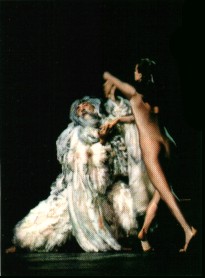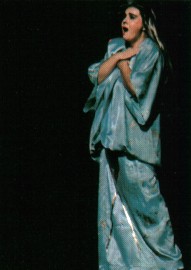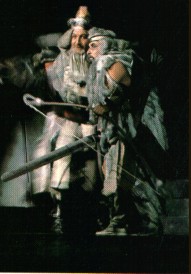GILGAMESH
The great opera
SYNOPSIS
In the ancient Sumerian city of Uruk, King Gilgamesh reigns, a mighty hero, two-thirds god, and only one-third man. In the temple of the goddess Ishtar the women priests are performing ritual preparations of a new maiden for King Gilgamesh, admired and feared by all; yet his tyranny meets with resistance on the part of his subjects, weighed down by the yoke of perpetual enforced labour. The gods create the mighty Enkidu, whom Gilgamesh fights at first, but later they set out together to do great deeds of valour in order to give some respite to the people of Uruk. Gilgamesh embraces Enkidu as a blood brother, his mother Rishat treats him like a son; at the call of the sun-god Shamash, they set forth to slay the monster Humbaba, guardian of the cedar forest. Gilgamesh and Enkidu triumpg over the robot Humbaba and return victorious to Uruk. This heroic deed overpowers the goddess of fertility and love, Ishtar herself, and she begs Gilgamesh to be her lover and husband. But Gilgamesh refuses her scornfully, reproaching her for earlier infidelities. The offended goddess incites her divine father to send the miraculous heavenly bull against the haughty King, but this adversary is also slain by the two heroes. Suddenly, Enkidy feels weak and hides, leaving Gilgamesh in utter dismay. The despairing King realises that he too is threatened by death and sets out on a journey to discover the secret of eternal life. The goddess Sidur tells him that the gods have given human geings a limited life, while securing eternity for themselves. Gilgamesh finds the progenitor Utnapishtim, sole survivor of the Flood whom the gods have guaranteed immortality; Gilgamesh too seeks a solution to the fundamental secret of human existence. Utnapishtim reveals to him the existence of a miraculous herb, hidden in the depths of the sea, which contains the gift of eternal youth. Gilgamesh reaches the goal of his quest: he finds the herb and decides to take it to Uruk and share it with the other heroes. While he bathes, a serpent steals the miraculous herb, and all his efforts come to nothing. On his return to Uruk he summons the shade of Enkidu to enquire about the secret of the afterlife. The shade of his friend appears and tells him that after death there is but dust and nothingness. Gilgamesh feels his end approaching and orders his scribe to record all his adventures, struggles and quests, aware that the memory of the mighty King shall never fade, not even after thousands of years.
Authors
Music: Rudolf BrucciLibretto: Arsenije Milosevic
Scenography: Zak Kukic
Audio clippings
Excerpt from Act III - Mourning songLoveplay

The Woman

King Gilgamesh and Enkidu

A LINK BETWEEN WORLDS - FUNDAMENTAL QUESTIONS OF HUMAN EXISTENCE
by Konstantin Vinaver
In an age unpropitious to new works of music for the stage written by Yugoslav authors, in which first nights of native works are very rare, indeed exceptional, the very fact that a full-length opera has been commissioned for the grat jubilee of the Serbian National Theatre from the well-known and outstanding Voivodinian composer Rudolf Brucci, Member of the Academy of Arts and Sciences, is an example to be followed in all parts of our country and on all occasions. The writing of the libreto and of the score, work on the production and the performance of this large work is the most important event on the Yugoslav music scene of the decade.
The ancient heroic epic of Gilgamesh is one of the most valuable among the preserved records of antiquity, whose power and beauty still radiate and attract us today. The epic raises the fundamental questions of human existence: the meaning of life, the inevitability of death, the struggle, the search for and the conquest of the immutable laws of eternity.
The author of the libretto, Arsa Milosevic, an eminent Belgrade television and theatre director, has adapted the ancient epic to the operatic stage, making use of all the existing translations of the epic into Serbo-Croatian, as well as several Russian and English translations. In addition to the ritual scenes and true arias of the main characters, the libretto includes nearly all of the action of the old Sumerian epic. The Brucci-Milosevic version of GILGAMESH is a true opera in which everything is sung. It makes use of modern scenic devices, for the opera-goer of today receives the impressions in equal measure by way of hearing and of sight. The words as sung and the musical expression attract the listener's attention from the first bar of the opera to the very last. All technical achievements in modern music are employed here, and when the action so demands, the sound of the orchestra is enriched by the synthesiser. In choral scenes, the use of archaic sound produces a “monumental effect”. The whole work is characterised by exuberant melodic invention, which makes GILGAMESH the right kind of opera for talented singers with rich voices. In the music literature for the stage in this country, the opera of GILGAMESH represents a lasting achievement which is likely to prove also of interest to foreign opera houses.

